
A motley crew led by Adam Hollioake went to Sharjah in the winter of 1997 and confounded expectations by coming back with England’s first one-day title for 10 years. Jo Harman looks back on how they pulled it off, speaking to captain, coach and the team’s unlikely star player .
It’s hard to overstate just how bad England were away from home in one-day cricket through much of the Nineties. From the end of the 1992 World Cup, a tournament Graham Gooch’s side came mightily close to winning, up until the winter of 1997, England won just 16 of 62 matches overseas, losing four bilateral series (including 6-1 and 3-0 thrashings in South Africa and Zimbabwe respectively) and drawing two.
In the 1994/95 B&H World Series they were not only soundly beaten by hosts Australia, but by Australia’s second string too, and they could only muster two victories at the 1996 World Cup in Asia, against UAE and the Netherlands.
Sticking rigidly to a formula which generally served them well at home was partly to blame, as was a tendency to field the Test team in the shorter format while touring overseas, however poorly suited the players were to it.
“For years, England selectors had failed to recognise that one-day international cricket was no longer just a novelty, money-spinning adjunct to Test matches, but a parallel branch of the game deserving of full and separate attention,” wrote Mike Selvey in Wisden.
And so when the ECB accepted an invitation to the Emirati desert in the winter of 1997 to take part in the Akai Singer Champions Trophy – a four-team round-robin tournament also featuring Pakistan, India and West Indies – David Graveney, England’s chairman of selectors, finally decided to tear up the well-worn manual.
With Mike Atherton sitting out the trip after a long Ashes summer, Adam Hollioake, Surrey’s fearless and inventive young skipper, stepped in as caretaker captain, and there were maiden call-ups for Warwickshire’s Dougie Brown and Kent’s Matthew Fleming, two all-rounders who’d cut their teeth over many seasons on the county circuit. There was also a recall for Ali Brown, a hard-hitting opener at Surrey who bizarrely hadn’t featured since scoring an ODI century against India a year earlier. And Dean Headley would lead the attack in the absence of Darren Gough, who opted to skip the tournament.
[breakout id=”0″][/breakout]
“They wanted to try one-day ‘specialist’ cricketers,” recalls David Lloyd, England’s coach at the time. “At the instigation of David Graveney, we selected these players who in some quarters would be labelled ‘bits-and-pieces’ cricketers, but as far as we were concerned they’d have an influence on three aspects of the game. Hollioake was a terrific appointment. Brilliant lad, up and at ’em, innovative. And without a doubt the lads played for him. In my opinion he was the first instigator, certainly for England, of no-fear cricket: it doesn’t matter if you get out, as long as you’re trying to do the right thing and push on.”
For Hollioake, who’d been named Player of the Series in England’s one-day clean sweep of Australia that summer but only had five ODI caps when he was given the captaincy, it was a case of keeping Atherton’s seat warm for him. “I saw it as a temporary position,” he tells Wisden.com. “It was always understood that Athers was the captain, I was just doing the job while he took a few weeks off. They weren’t expecting us to do very well, and no one expected us to win, probably including me.”
***
The ECB had previously been reluctant to play in Sharjah due to rumours of match-fixing at the venue, and Hollioake had barely started in his new role when he was contacted by a bookmaker.
“Match-fixing was a pretty big topic inside cricket at the time and we were told before we went out there that there was a chance we’d get approached. I’d literally been in my hotel room for half an hour when someone messaged me asking for information on the teams and the pitch. I told him he had to go through the normal channels and book an interview. He said, ‘I’m a bookmaker and I’ll pay you money’. I was like, ‘Mate, it’s my first game as captain of England, you’ve got the wrong guy!’ I reported it to David Graveney and the ICC.”
[caption id=”attachment_180658″ align=”alignnone” width=”800″]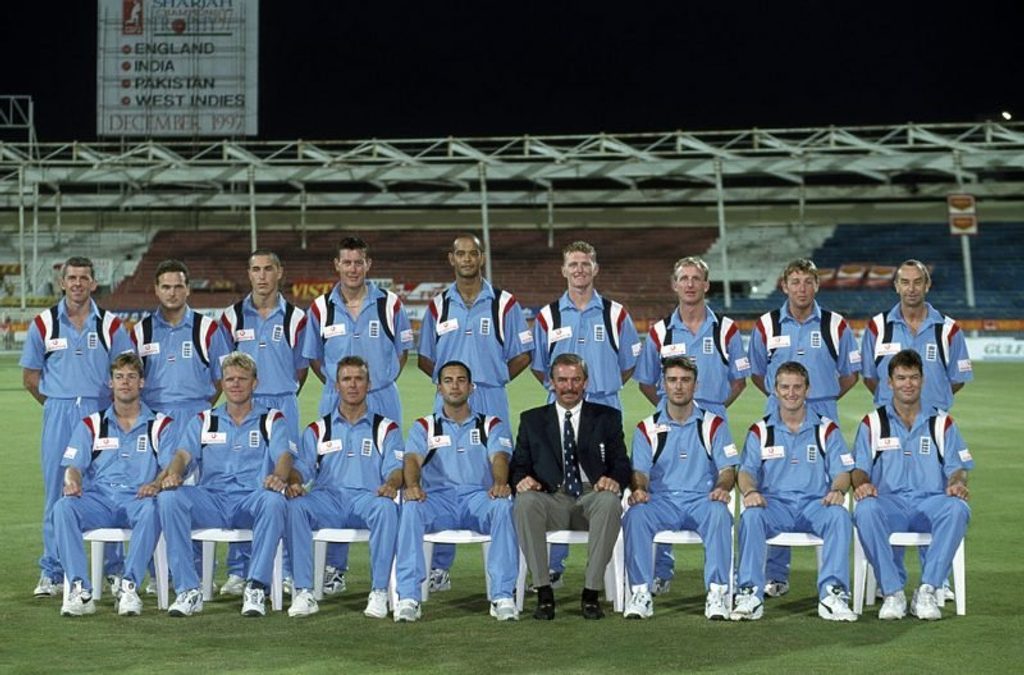 The Sharjah boys[/caption]
The Sharjah boys[/caption]
The tournament would later be red-flagged in the Justice Qayyum Commission, which investigated allegations of match-fixing involving Pakistan players, although nothing was ever proven.
“At the time we wouldn’t have had an inkling but in later years the tournament was fingered as being a bit doubtful,” says Lloyd. “The one thing I recall is I’d never seen so many mobile phones, all around the dressing-room areas. People who were outsiders, they weren’t part of the job.”
For Fleming – a former British Army officer and the great nephew of Ian Fleming, the creator of James Bond – any suggestions of skullduggery couldn’t have been further from his mind. The 32-year-old was busy lapping up his unexpected late crack at international cricket after impressing for England in the Hong Kong Sixes a month earlier. Handed his debut in the opening match of the Champions Trophy against India, the veteran all-rounder took 4-45, including the prize scalp of Sachin Tendulkar, as England defended 250 to win a thriller by seven runs.
“There’s a great bit of commentary where Geoffrey Boycott says what an unbelievably clever bit of bowling it was to get Tendulkar out,” says Fleming. “That I saw him coming and bowled it full and wide. Absolutely not true! A full wide ball slipped out at the same time as Tendulkar charged down the wicket and Alec Stewart did a brilliant bit of work to stump him.”
Kent’s captain was then entrusted with the last over, claiming the final wicket to seal a victory set up by Stewart’s second ODI century.
“Bowling the last over, that was my job. I’d been doing it for yonks at Kent and I was lucky enough to have been a solider for three or four years, so I had a pretty broad perspective when it came to pressure. And Adam gave you the feeling that you were the only person in the world who could do the job he was about to ask you to do, which is a real skill. There was no opaqueness to Adam at all. He was dead straight. He said exactly what he thought so you knew exactly where you stood.”
[caption id=”attachment_180659″ align=”alignnone” width=”800″]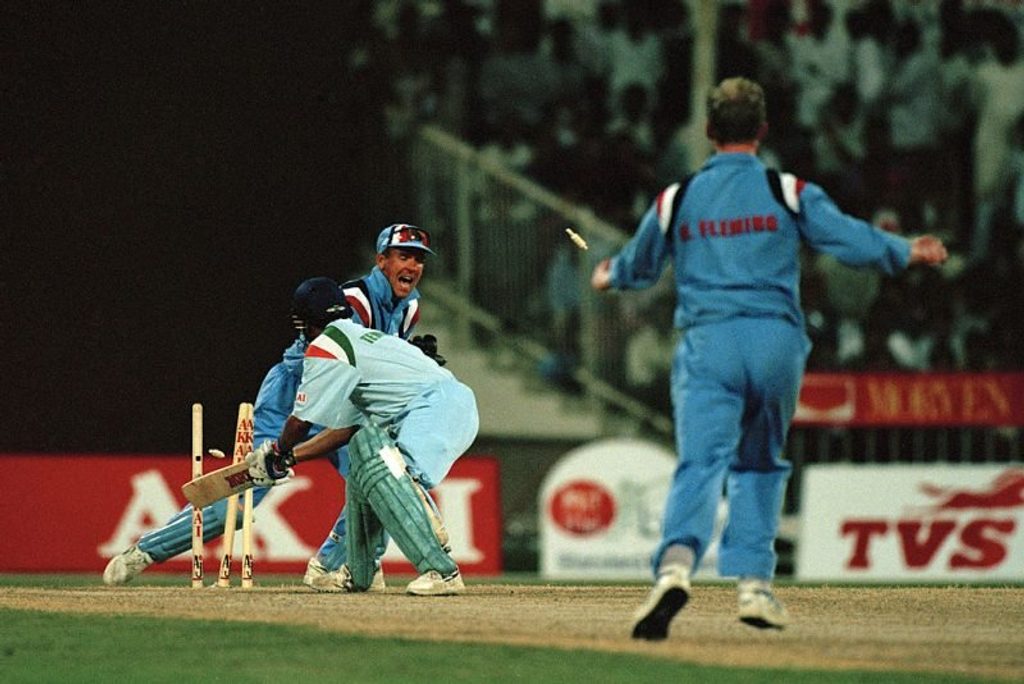 Alec Stewart stumps Sachin Tendulkar on 91[/caption]
Alec Stewart stumps Sachin Tendulkar on 91[/caption]
Next up were the West Indies, who’d beaten Pakistan in their opening fixture, and England made an electric start when Brown cleaned up Philo Wallace with the first ball of the match and then trapped Brian Lara lbw for a duck two deliveries later. The Windies could only limp to 197-7 despite Carl Hooper’s unbeaten century.
Complemented by the pace of Headley and Robert Croft’s off-breaks, England’s army of medium-pacers, which also included the Kent metronome Mark Ealham, were finding the slow, low pitches of Sharjah to their liking, and following Hollioake’s gameplan to perfection.
“Don’t get me wrong,” says Hollioake, “I would’ve preferred to have a mystery spinner who spun it both ways, rather than an armada of 70mph bowlers! But those guys just did their jobs so well. I said: ‘Let’s just bowl at the top of middle stump, hit the wicket, nothing full, and vary our pace. It doesn’t matter who comes in – Lara, Tendulkar, we’ll just do the same. Forget who’s down the other end.’ And we fielded like wild men.”
Graham Thorpe’s half-century steered the chase, before Ealham and Dougie Brown took England home by four wickets, putting the underdogs on course for the final.
Confidence was building in the camp, and so too was a team spirit which Hollioake hadn’t experienced before on England duty. “We knew we had nothing to lose, and that the team was probably going to be disbanded after that trip, so we could just enjoy it. Matthew Fleming was amazing, loving playing for England, with a smile on his face. Dougie Brown, too. I really feel that rubbed off on the rest of the team.
“I captained a couple of trips after that and it was amazing the amount of people that came in who were paralysed by fear, scared of not getting picked next time. But on that tour they played like it was backyard cricket, like kids playing for the love of the game.”
England still needed to beat Pakistan to guarantee their place in the final, and their prospects looked gloomy after they could only post 215-9, Stewart top-scoring with 47. When Saeed Anwar cruised to a half-century in reply, taking Pakistan to 99-2, the match looked all but done, but England’s ‘armada’ kept chipping away. Croft made the crucial breakthrough, clean bowling Anwar, before Hollioake took the key wickets of Wasim Akram and Azhar Mahmood as the Pakistanis slumped to 207 all out.
[caption id=”attachment_180660″ align=”alignnone” width=”800″]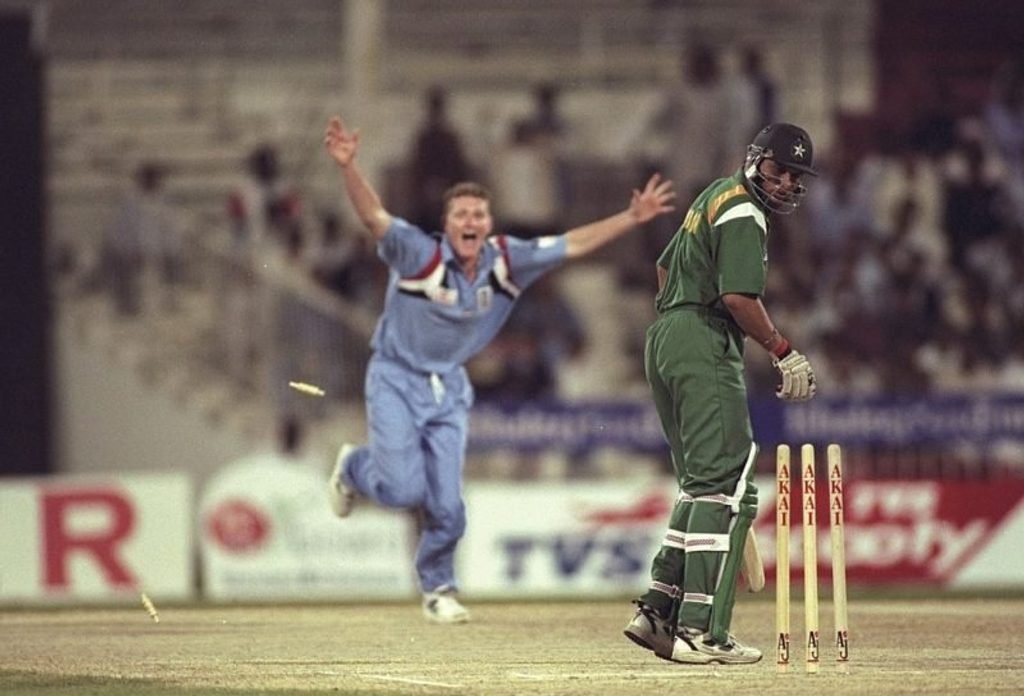 Dougie Brown celebrates dismissing Shahid Afridi[/caption]
Dougie Brown celebrates dismissing Shahid Afridi[/caption]
In Justice Qayyum’s investigation, the results of which were published in 2000, Wasim was accused of tampering with the batting order during the defeat to England. Pakistan’s captain was ultimately given the “benefit of the doubt”, although the commission described him as “not above board”. He was fined £3,700 and a further probe into his assets was recommended.
“We kept getting over the line and other sides kept not getting over the line,” says Fleming. “They [Pakistan] had us completely by the bollocks. At the time we gave ourselves the credit because there were no question marks, and I prefer to believe that it was down to our skill and ability to perform under pressure, rather than anyone else’s desire not to perform under pressure.”
“I’m not bothered what other people say,” adds Lloyd. “I was there and I know that we sweated buckets and played some wonderful cricket. You give me the proof. Give me the evidence. We played bloody well.”
***
Against all the odds, England were in the final, where they would take on West Indies. In a recurring theme of the tournament, the Windies openers Shiv Chanderpaul and Stuart Williams were fast out of the traps, but as the ball softened and started to stay low, Fleming and Ealham slowly turned the screw.
A superb piece of fielding from Fleming saw the back of Chanderpaul, diving full length at point and hitting the one stump he had to aim at, before Ealham had Lara stumped third ball. When Fleming took the key wicket of his Kent teammate Hooper, the Windies lost momentum, eventually finishing on 235-7.
A Stewart half-century laid the platform for England’s chase but a flurry of dismissals left them needing 74 from the last 10 overs with four wickets remaining. Thorpe, batting beautifully in tricky conditions, was joined at the crease by Fleming.
“It helped batting with Graham Thorpe,” says Fleming. “He was a high-quality batsman and it’s easier to play the way I play if you haven’t got the ultimate responsibility of bringing the team home. Thorpe allowed people to bat around him with freedom.”
“When you’re Matthew Fleming you can play like a millionaire, because you are a millionaire!” laughs Lloyd.
Fleming’s quickfire 33, from just 26 balls, gave Thorpe the support he needed, the Surrey left-hander guiding England to victory with 11 balls to spare. Hollioake’s motley crew, thrown together on a whim, had claimed England’s first one-day title for 10 years.
[caption id=”attachment_180663″ align=”alignnone” width=”800″]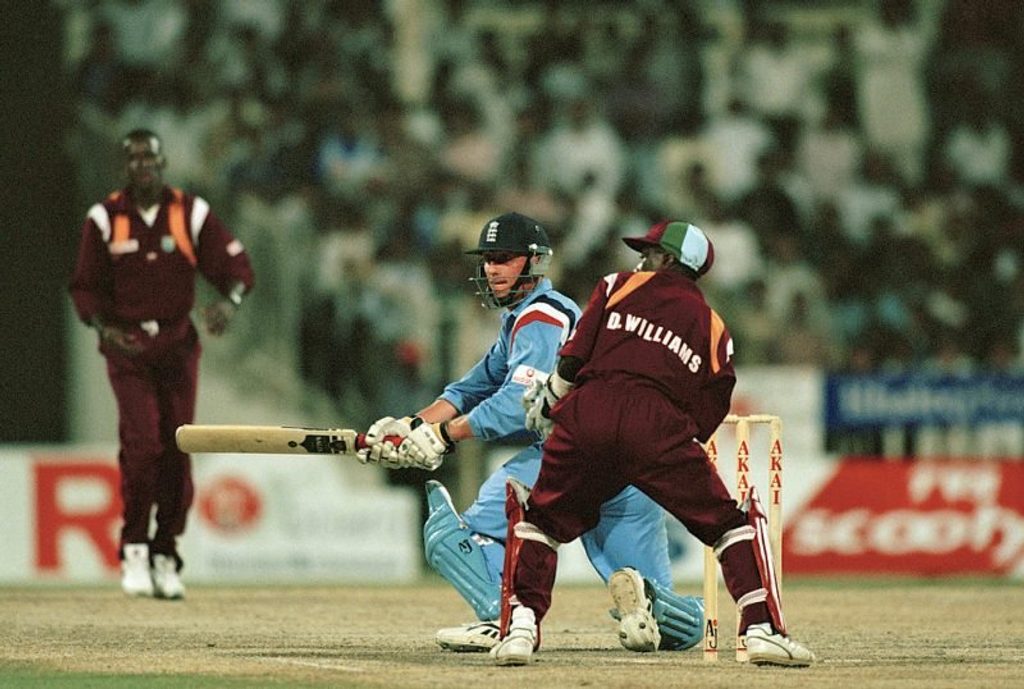 Matthew Fleming batting for England in the final against West Indies[/caption]
Matthew Fleming batting for England in the final against West Indies[/caption]
“The game finished at about 10pm and it would have been around midnight when we got back to the hotel, and we had to catch a flight at 5 that morning,” recalls Hollioake. “It’s fair to say that everybody on that plane was drunk. I didn’t make it to sleep that night. It’s the most fun to party with people who you genuinely care about, and I felt like that group really cared about one another. Any other England team I played for, I never felt that.
“I remember it being pretty rowdy, and it being a genuine concern that I might end up missing the flight, or getting arrested. Anything could have gone wrong at that stage.”
Lloyd has memories – unconfirmed – of a plant pot somehow making its way “down about four floors” and smashing into pieces in the hotel foyer, while Ealham’s arrival had the team in stitches when it was time to head to the airport.
Earlier on the trip Ealham had wheeled Fleming into the deep end of the hotel swimming pool while he was sleeping on a sun-lounger, and his county skipper had played the long game when planning his revenge. After bribing the hotel manager to get the master key for Ealham’s room, Fleming let himself in and stole his teammate’s England uniform trousers. “I took them to a local tailor and I had them taken up by eight inches, complete with turn-ups, before putting them back. The memory of Ealy, slightly worse for wear, coming out of the lift into reception wearing trousers which came to mid-calf still gives me pleasure now.”
[caption id=”attachment_180665″ align=”alignnone” width=”800″]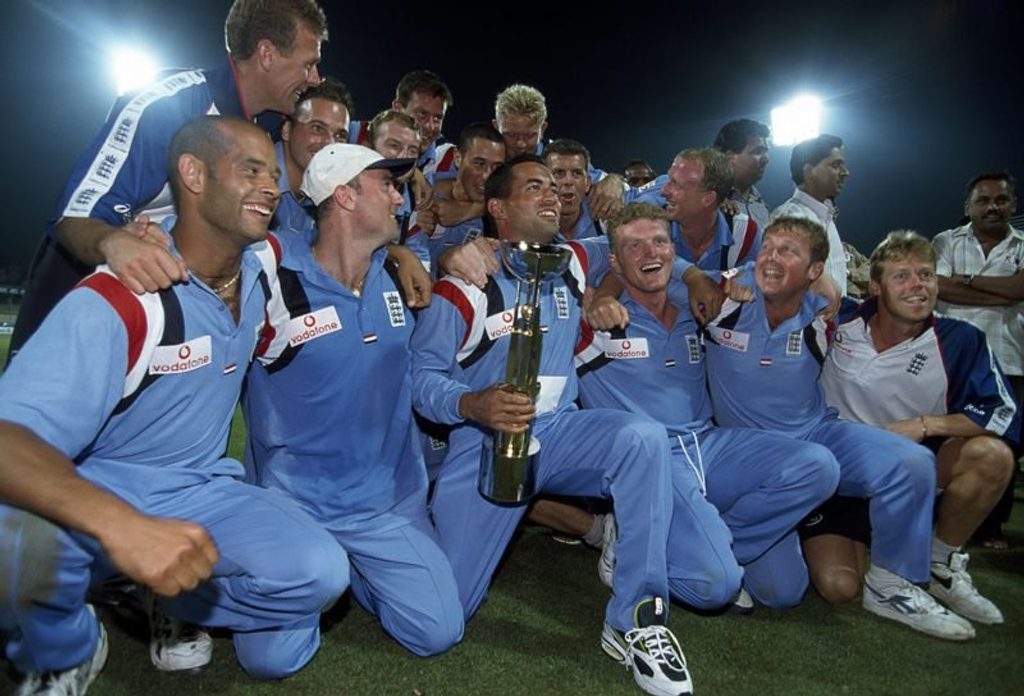 Hollioake’s troops celebrate a historic win[/caption]
Hollioake’s troops celebrate a historic win[/caption]
The tour came to what felt like a natural conclusion when Hollioake was placed on a conveyor belt and posted through the x-ray machine at the airport. “There were some very surprised people at customs,” says Fleming.
***
In the wake of that unlikely triumph, the ECB took the unprecedented step of splitting the captaincy, giving Hollioake the one-day leadership on a permanent basis. But the Sharjah victory was not a harbinger of better things to come.
England won just nine of their next 28 ODIs heading into the 1999 World Cup on home soil, and Hollioake was replaced as skipper by Stewart a few months out from competition – which the hosts infamously exited before the official song had even been released.
Of the 11 players who featured in Sharjah, four weren’t selected for the World Cup a year-and-a-half later, with Fleming and Dougie Brown, so influential in that win, playing only a handful more matches between them.
So did England depart too quickly from that winning formula, or was it always destined to be a glorious one-off?
“It’s easy to say they should have played the side which won out there,” says Hollioake, “but it was a very different game [in England], with different tactics and people required. The conditions – with a Duke ball on early-season wickets – were the complete opposite to Sharjah, so to think that we’d have been able to take that side to the World Cup in 1999 is naïve. It wouldn’t have worked. But I still feel that there were a number of people from that side who might have been given a couple more opportunities.”
Fleming concedes that while some of the personnel may have needed to change, England’s selectors missed a trick by not embracing the team spirit which had developed in Sharjah.
“When England selected a team for the 1999 World Cup, they completely failed to understand why we had done well in Sharjah. I was pissed off that I wasn’t in that squad, but I could understand it. I was more pissed off that they had dismantled the characteristic of that squad.
“I don’t think the selectors realised what a key part of the winning formula the character within that team was, and I think they got rid of too many of the genuinely selfless characters. People like Dougie Brown – who were enthusiastic and really pleased for you if you did well. They had quite a lot of introverts in 1999, when there was real pressure playing at home, and no one to release that pressure. The whole thing was based on fear, rather than imagination and courage.”
At the turn of the century, Sharjah was also left in the shade, the stadium blacklisted by India due to the match-fixing allegations that continued to swirl around it. Having hosted nearly 200 ODIs between 1984 and 2003, it lay dormant as an international venue for seven years. Rehabilitated in recent years, Sharjah is now the toast of the IPL, England’s have-a-go heroes of ’97 a distant memory.








